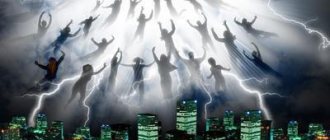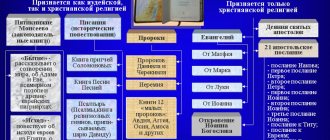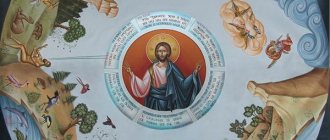As you know, only insecure religious organizations prohibit their members from asking questions. And no wonder - there is simply nothing to answer! For unscrupulous preachers, a critical look at tradition becomes a challenge that threatens to expose them. Orthodoxy takes a different position and is always open to dialogue.
A favorite target of opponents is contradictions in the Bible. But every Christian must be patient and know how to explain away contradictions when possible. Let's talk here about contradictory and supposedly contradictory passages in the Holy Scriptures.
There really are contradictions in the Bible because it is an ancient text that has survived a lot
There is no escape from the fact that there are errors and contradictions in the Holy Scriptures. An important point that Christians and their opponents miss is that the Bible was not written by the Lord God, but by people. Each person has his own point of view, has his own temperament, differs in the style of presentation of thoughts and memory abilities.
There are errors and contradictions in the Holy Scriptures, but they are easily explained
It is enough to look at the canonical Gospels to understand that the same story can be told in different ways, with different emphases, added and omitted episodes.
As a result, each book goes through a lot of stages, which can greatly affect its content:
- The author understands and expounds Divine revelation in his own way;
- Sometimes it is not the prophet himself who writes down, but someone else from his words (for example, the Gospel of Luke was not written by an eyewitness to the events);
- Often the original text is just a draft, and its literary processing takes place later (the canonical Gospels were probably at first only notes with the sayings of Christ, and acquired their completed form later);
- Biblical texts do not reach us in the original; they are rewritten many times, which is why errors are inevitable;
- Many manuscripts arrived after translation, where there were definitely some losses;
- Some scribes of biblical books deliberately distort them. If a manuscript has arrived in a single copy, it is sometimes impossible to establish its original content.
The Apostle Luke, depicted on this icon, was not a witness to the Gospel events.
The text of the Gospel of Luke was clearly written from the memories of others, and therefore in some places contradicts other Gospels. In addition, one should not discount the fact that centuries may pass between the creation of a biblical book and its recording. The Pentateuch of Moses tells the story of the flood, which was known in Mesopotamia in the 30th century BC, Moses, who told them to the Jews, lived in the 15th century BC, and the manuscripts of the first books of the Bible that have come down to us are recorded in the 6th century BC. IV centuries BC.
Of course, the texts simply could not be preserved without loss.
Logical conclusions
One of the consequences of the Law of Contradiction is the concept that “two incompatible (contradictory) propositions cannot be both true.”
A door can be open or closed, but the same door cannot be open and closed at the same time. Open and closed are opposites, but they do not contradict each other if they are not stated at the same time about the same subject.
The principle is this: opposites are not necessarily contradictory. Let's apply this principle to some biblical issues.
Does God both love and hate?
Does the Bible contradict itself, as is often said, when it states that God both loves and hates? No, for, although these terms are opposites, they do not express His disposition towards the same objects.
God loves every sinner in the world (John 3:16), but He hates every way of lies (Psalm 119:104). He loves righteousness but hates iniquity (Psalm 45:7), and therefore responds with either kindness or severity (Romans 11:22).
There is no contradiction here.
Is Paul both perfect and imperfect?
Was Paul both “perfect” and “imperfect”? Some accuse him of saying so.
In Philippians 3:12, the apostle said that he was not yet “made perfect,” and in verse 15 he wrote, “Therefore, if anyone among us is perfect, he must think this way.” How to solve this problem?
A careful analysis of the language used will resolve this perceived inconsistency.
When Paul claimed that he was not “perfect,” he was using the perfect temporal form of the Greek term, which literally implied the apostle had not yet reached a permanent state of perfection.
On the other hand, in the last verse Paul used an adjective that actually means “adult” or “mature” (note how the same term is used in contrast to infantilism in 1 Corinthians 14:20 and Ephesians 4:13).
So, although Paul denied that he already possessed permanent perfection, he claimed that he possessed spiritual maturity. There is no conflict between these passages.
Addition should not be confused with contradiction
Another important point to emphasize is that addition should not be confused with contradiction. In a contradiction, the two facts are mutually exclusive; in addition, the two facts simply complement each other.
For example, if someone says Ivan is married, and then says that the same Ivan is not married, this is a contradiction. On the other hand, if someone says that the same Ivan is the father, this is not a contradiction. This is just additional statement number two.
Many supposed discrepancies in the Bible can be resolved by recognizing this principle.
Healings of the blind people of Jericho
The case of the healing of the blind men of Jericho makes an interesting study in addition (Matthew 20:29-34; Mark 10:46-52; Luke 18:35-43). Two important problems were posed.
- First, although Mark and Luke mention the healing of one blind man, Matthew records the healing of two blind men.
- Second, Matthew and Mark indicate that the blind men were healed as Jesus left Jericho, while Luke seems to suggest that the blind man was healed as the Lord "approached" the city.
In discussing these passages, let us not forget the vital consideration that if there is any reasonable way of reconciling these records, no legitimate contradiction can be brought on this account!
How can these stories be reconciled? Several reasonable possibilities have been raised by learned writers.
Firstly, the fact that two messages mention only one person, while the other mentions two, does not bother us. If Mark and Luke had stated that Christ healed only one person, and Matthew had affirmed that more than one were healed, the error would certainly have been obvious, but this is not the case.
If someone says, “I have a son,” he is not contradicting himself by further declaring, “I have a son and a daughter.” The last statement only complements the first. Thus, there is no discrepancy regarding the number of men participating in this event.
But how will the second problem be solved? Several reasonable possibilities have been put forward.
Bible atlas, encyclopedia and color maps for Bible study
- It is possible that three blind men were healed in the vicinity of Jericho on this occasion, and that the incident mentioned by Luke, which occurred as Jesus approached the city, may have represented a different miracle than that recorded by Matthew and Mark. This may not be the most likely explanation, but it cannot be disproved.
- Edward Robinson argued that the verb engizo , meaning "to draw near" (Luke 18:35), can also mean "to be near." He cited evidence from the Septuagint (1 Samuel 21:2 - "it is near to my house" [cf. Deuteronomy 21:3, Jeremiah 23:23, Ruth 2:20 and 2 Samuel 19:42]) and from the New Testament (Luke 19:29; cf. Matthew 21:1 and Philippians 2:30).
Thus, he translated Luke 18:35 as "while he was near (or near) Jericho." This view implies that Luke simply placed the miracle near Jericho; thus they can be consistent with other records. - Perhaps the most popular view of authoritative writers is the fact that in the time of Christ there were actually two Jerichos. First, there was the Jericho of the Old Testament history (Joshua 6:1; 1 Sam. 16:34), which was located at the sight of source of Elijah. In the first century, however, this city lay almost in ruins. About two miles south of this site was the new Jericho built by Herod the Great.
The Lord, moving from the north towards Jerusalem, first passed through old Jericho, then several miles to the southwest, passed through Jericho. Therefore, the miracles in question could have been performed between the two cities.Accordingly, the reference in Matthew and Mark to leaving Jericho will refer to the old city, while Luke's observation to approaching Jericho will refer to the newer village (see Robertson, 1930, 1:163).
Many contradictions in the Bible can be explained by the merging of several sources into one text.
Many books of the Bible arose from mergers. For example, compare this passage:
“Bring also into the ark [of every livestock, and of every creeping thing, and] of every living creature, and of every flesh, two by one, so that they may remain alive with you; let them be male and female. Of [all] birds according to their kinds, and of [all] livestock according to their kinds, and of every creeping thing that creeps on the earth according to their kind, of all of them two by two will come to you, so that they may remain alive [with you, male and female]. "
Gen 6:18–20
and this passage
“And take seven of every clean animal, male and female, and two of every unclean animal, male and female; also from the birds of the air [clean] in sevens, male and female, [and from all unclean birds in twos, male and female].”
Gen 7:18–20
That is, in chapter 6 of Genesis, God calls on Noah to take two of each animal, and in the seventh he says that clean animals must be taken in the amount of seven.
There are plenty of these contradictions in the Pentateuch: the route of the exodus, the sequence of the creation of the world, etc. And there is only one reason: the Pentateuch was collected from 4 different sources:
- Yahwist;
- Elohist;
- Priestly book;
- Deuteronomy.
In this picture you can see that there are more than two sheep.
This is not surprising, because in chapter 7 of the book of Genesis, God requires Noah to take 7 clean animals onto the Ark. This contradicts the version from chapter 6. All this is due to the fact that the book was written on the basis of several sources. If two sources had conflicting versions, both were often retained. Fortunately for the Orthodox, all the facts that have suffered as a result of these discrepancies do not relate to recommendations important for a righteous life.
Following the discussions
: Contradictions in the Bible,
conversation three
This series of conversations
deals with seeming contradictions in the Bible. Note: not contradictions, but apparent or imaginary contradictions. For centuries, opponents of God and His Word have been trying their best to look for contradictions in the Holy Scriptures, but they can never find them. Our discussions about contradictions in the Bible will help you understand that there are no such things in the Bible.
APPEARING CONTRADITION No. 22
- 1. Deuteronomy 10:22
“
Your fathers came into Egypt with seventy souls, and now the Lord your God has made you as numerous as the stars of heaven
.”
2. Acts 7:14
“Joseph sent and called his father Jacob and all his relatives, seventy-five souls.”
Contradiction
: So how many souls did the Jews come to Egypt with?
Explanation: Exodus 1:5
“Now all the souls that came from the loins of Jacob were seventy, and Joseph was already in Egypt.”
Genesis 46:26-27
“
All the souls that came with Jacob into Egypt, which came from his loins, besides the wives of the sons of Jacob, were altogether sixty-six souls.
The sons of Joseph, who were born to him in Egypt, are two souls. All the souls of the house of Jacob that went over to Egypt were seventy .”
As for Acts 7:14
, the original Greek word used is “
hebdomekonta
” – 70. This is the same word used in Luke
10:1, 17
“
After these things the Lord chose also seventy other disciples, and sent them two before His face into every city and place where He Himself wanted to go... The seventy disciples returned with joy and said: Lord!
and the demons obey us in Thy name .” Where did the number 75 come from? This figure is taken from the Septuagint (Greek translation of the Old Testament), in which, for some reason unknown to us, five names of the descendants of Joseph were added, descended from his two sons Manasseh and Hebrew (Genesis 48:5): The three sons of Manasseh - Asriel, Machir and Zalpaad , as well as the son of Machir - Keresh, and the son of Ephraim - Shutelah (Genesis 50:23, Numbers 26:28-35, Joshua 17:1, 1 Chronicles 7:14-21).
APPEARING CONTRADITION No. 23
- 1. The Bible says that God made Solomon the wisest man on earth, and that there never was and never will be a wiser man: 1 Kings 3:12
“
Behold, I will do according to your word: behold, I have given you a wise and understanding heart , so that there was no one like you before you, and after you there will not arise one like you,
”
1 Kings 4:29
“
And God gave Solomon wisdom and very great understanding, and a broad mind, like the sand on the seashore
,”
1 Kings 10:23 -24
“
King Solomon surpassed all the kings of the earth in wealth and wisdom.
And all the kings on earth sought to see Solomon in order to listen to his wisdom, which God had put in his heart .”
2. However, in Matthew 12:42
and
Luke 11:31,
Jesus says: “
The queen of the south will rise up in judgment with this generation and condemn it, for she came from the ends of the earth to hear the wisdom of Solomon;
and behold, here is greater than Solomon .”
Contradiction
: Don't these passages contradict each other?
Explanation
: Firstly, we must not forget that Solomon was a man, and Jesus was not just a man, but a God-man, that is, God in the flesh.
Therefore, this comparison of Jesus with Solomon does not work in favor of the alleged contradiction that has arisen here. Secondly, there is no contradiction between these verses. A passage from the New Testament only testifies that Jesus is God, and here's why: From 1 Kings 3:12
we know that there could be no one on earth wiser than Solomon.
Only the Lord God, who gave him wisdom and greatness, could be wiser than Solomon. So, passages from Matthew 12:42
and
Luke 11:31
indicate that Jesus is the one who is “greater than Solomon,” that is, that Jesus Christ is the very God who gave wisdom to King Solomon.
Third, this is what Jesus said about Himself in John 8:58,
“
Jesus said to them, “Truly, truly, I say to you, before Abraham was, I am
.” This statement of Jesus testifies that He is the Lord God.
APPEARING CONTRADITION No. 24
- 1. The Old Testament - 2 Kings 4:32-37
describes the resurrection of a dead child by the prophet Elisha.
In the New Testament: Matthew 9:18-25
and
John 11:38-44
record stories of Jesus raising the dead.
2. However, Acts 26:23
says that Jesus was the first to rise from the dead: “
Christ had to suffer and, being the first to rise from the dead, to bring light to the people (Jews) and the Gentiles
.”
Controversy
: How is Jesus called the first to rise from the dead when there are so many examples in the Bible of people who died and rose again before the resurrection of Jesus Christ?
Explanation
: There are many additional examples in the Bible of the resurrection of dead people, both in the Old and New Testaments (including the story of how the Apostle Paul raised a young man who fell from the third floor -
Acts 9:9-10
).
However, all these people who were once miraculously resurrected later died again. That is, their resurrection was a kind of “healing”... The resurrection that Paul speaks of in Acts 26:23
is a resurrection of a different kind.
This is the resurrection to eternal life - that is, the acquisition of a new, incorruptible body: 1 Corinthians 15:51-54
“
I tell you a mystery: we will not all die, but we will all be changed in a moment, in the twinkling of an eye, at the last trumpet;
For the trumpet will sound, and the dead will rise incorruptible, and we will be changed. For this corruptible must put on incorruption, and this mortal must put on immortality. When this corruptible has put on incorruptibility and this mortal has put on immortality, then the word that is written will be fulfilled: “Death is swallowed up in victory .”
2 Corinthians 5:2-4
“
For this reason we groan, desiring to be clothed with our heavenly habitation;
As long as we don’t end up naked even though we’re dressed. For we, being in this hut, groan under the burden, because we do not want to be unclothed, but to be clothed, so that what is mortal may be swallowed up in life .”
So, Jesus Christ was the firstborn of those who died and rose again in a new, incorruptible body: 1 Corinthians 15:20-23
“
But Christ was raised from the dead, the firstborn of those who died.
For just as death is through man, so is the resurrection of the dead through man. Just as in Adam all die, so in Christ all will come to life, each in his own order: Christ the firstborn, then those who belong to Christ at His coming .”
In this regard, we recommend that you read the article “Resurrection of the Dead”
.
APPEARING CONTRADITION No. 25
- 1. One part of the Bible encourages a person to acquire wisdom: Proverbs 3:13
“
Blessed is the man who gets wisdom, and the man who gets understanding
”,
Proverbs 4:7
“
The main thing is wisdom: get wisdom, and with all your having get understanding
”,
James 1:5
“
If any of you lacks wisdom, let him ask God, who gives generously to all without finding fault, and it will be given to him
.”
2. Another part of the Bible states that wisdom is foolishness: 1 Corinthians 1:19
“
For it is written, I will destroy the wisdom of the wise, and destroy the understanding of the wise
.”
1 Corinthians 3:18-20
“
Let no one deceive himself.”
If any of you thinks to be wise in this age, let him be foolish in order to be wise. For the wisdom of this world is foolishness in the sight of God, as it is written: It catches the wise in their wickedness. And again: The Lord knows the thoughts of the wise, that they are vain .”
Contradiction
: So why acquire wisdom if it is stupidity?
Explanation
: The first rule of Bible interpretation is to read Bible verses in their context.
This is also true of 1 Corinthians 1:19. We read it in context: 1 Corinthians 1:19-25
“
For it is written: I will destroy the wisdom of the wise, and destroy the understanding of the prudent.
Where is the sage? where is the scribe? where is the questioner of this century? Has not God turned the wisdom of this world into foolishness? For when the world through its wisdom did not know God in the wisdom of God, it pleased God through the foolishness of preaching to save those who believe. For both the Jews demand miracles, and the Greeks seek wisdom; and we preach Christ crucified, for the Jews a stumbling block, and for the Greeks foolishness, but for those who are called, Jews and Greeks, Christ, the power of God and the wisdom of God; for the foolish things of God are wiser than men, and the weak things of God are stronger than men .”
One would have to be blind not to see that in this passage two types of wisdom are contrasted: worldly (human, demonic) and God's wisdom. Psalm 110:10
“
The fear of the Lord is the beginning of wisdom;
"All who do His commandments have a right mind ."
This verse shows that the beginning of wisdom is the fear of the Lord. Let me ask: How much fear of the Lord is there in worldly wisdom? The Lord God gives wisdom to every person who seeks true wisdom. James 1:5
“
If any of you lacks wisdom, let him ask God, who gives generously to all without finding fault, and it will be given to him
.”
If the author of this question had sought God's wisdom with all his heart, he would have found it and would not have considered his question to be an example of a contradiction in the Bible. In this regard, we recommend that you read the article “Two Types of Wisdom”
.
APPEARING CONTRADITION No. 26
- 1. In Matthew 1:19-20
we read that an angel appeared to Joseph: “
And Joseph her husband, being righteous and not wanting to make Her public, wanted to secretly let Her go.
But when he thought this, behold, the Angel of the Lord appeared to him in a dream and said: Joseph, son of David! Do not be afraid to receive Mary your wife, for what is born in her is of the Holy Spirit .”
2. In Luke 1:26-28
we read that an angel appeared to Mary: “
In the sixth month the angel Gabriel was sent from God to a city of Galilee called Nazareth, to a virgin betrothed to a husband named Joseph, of the house of David;
The name of the Virgin is: Mary. The angel, coming to Her, said: Rejoice, full of grace! The Lord is with You; Blessed are You among women ."
Contradiction
: So which of them did the angel actually appear to?
Explanation
: To both: each in due time.
APPEARING CONTRADITION No. 27
- 1. There are many places in the Bible that testify that: First, God dwells in heaven and therefore He is called the Heavenly Father - Matthew 6:9
“
Our Father who art in heaven!”
“Secondly, angels dwell in heaven:
Mark 12:25
“
For when they rise from the dead, they will neither marry nor be given in marriage, but will be like the angels in heaven
.”
Third, that believers will inherit eternal life in heaven: 1 Peter 1:3-4 “ Blessed be the God and Father of our Lord Jesus Christ, who according to His great mercy hath begotten us again, through the resurrection of Jesus Christ from the dead, to a living hope, to an inheritance incorruptible and undefiled, unfading, kept in heaven for you
."
2. At the same time, many other verses in the Bible indicate that heaven will cease to exist: Matthew 24:35
“
heaven and earth will pass away, but My words will not pass away
” (same in
Mark 13:31
and Luke 21:33).
Isaiah 34:4
“
And all the host of heaven will be destroyed;
and the heavens will be rolled up like a book scroll; and all their army shall fall as a leaf falls from the vine, and as a withered leaf from the fig tree .”
Controversy
: What inheritance can there be in heaven, and how will believers enjoy it if heaven perishes (ceases to exist)?
Explanation
: First, we must not forget that the Bible talks about three heavens: (1) The first heaven is the earth's atmosphere - the air that we breathe and through which birds and airplanes fly;
(2) The second heaven is space in which the earth, stars, planets and other celestial bodies exist; (3) The third heaven is the heaven in which the Lord dwells - the sky invisible to humans (like another dimension). These passages talk about space: the sky in which the earth with its earthly atmosphere is located. That is, the first and second heavens are described. Secondly, we must remember that when our heaven and earth cease to exist, the Lord will take His children to where He has prepared for them a new heaven and a new earth: Revelation 21:1
“
And I saw a new heaven and a new earth; the sky and the former earth have passed away, and the sea is no more
.”
2 Peter 3:13
“
Nevertheless, according to His promise we are looking forward to new heavens and a new earth, in which righteousness dwells
.”
This promise is given in the Book of the Prophet Isaiah 65:17-19
“
For behold, I am creating new heavens and a new earth, and the former will no longer be remembered, neither will they come to the heart
.”
APPEARING CONTRADITION No. 28
- 1. Jesus calls his followers to hate their loved ones: Luke 14:26
“
If anyone comes to Me and does not hate his father and mother, and wife and children, and brothers and sisters, and even his own life, he cannot be My student
."
2. Jesus calls to love your neighbor: Matthew 22:39
“
love your neighbor as yourself
.”
3. The 5th commandment teaches to honor your parents
: “
Honor your father and your mother, so that your days may be long in the land that the Lord your God is giving you
” (
Exodus 20:12
).
Contradiction
: What does the Bible call for: to honor your parents or to hate, to love your neighbor or to hate?
Explanation
: As always, the author of the question confuses different concepts.
There is no doubt that the Lord calls us to love our neighbor. Loving your neighbor means not doing to him what you would not want to experience yourself. According to the definition of love given in 1 Corinthians 13:4-7, to love is to be long-suffering and merciful toward others, not to envy, not to be arrogant, not to be proud, not to be outrageous, not to seek one’s own, not to be angry, not to take revenge. , do not plot evil, do not rejoice in untruth, but rejoice in the truth, etc. and so on. As for the verse from the Gospel of Luke (Luke 14:26), it is not about hatred of one’s neighbor and parents, but of love for God. Jesus does not call anyone to hate family and friends. By saying, “ If anyone comes to Me and does not hate his father and mother and wife and children and brothers and sisters, yea, and his own life, he cannot be My disciple
,” Jesus uses an unusual turn of phrase to show that love for the closest and dearest person, as well as for one’s own life, is nothing, or rather, resembles hatred in comparison with the love for God that a true disciple and follower of Christ experiences.
What can this turn of phrase be compared to or how can it be illustrated? Prepare a mug of hot, strong tea for yourself and stir a spoonful of sugar in it. If you try this tea, it will taste sweet... Now eat two or three tablespoons of jam or honey, and then try your tea again. This time it will be more difficult for you to taste the sweetness of the tea, because the jam or honey that you just ate was so sweet that the sugar in the tea is not felt at all in comparison. It may even seem that the tea is completely unsweetened. This illustrates Jesus Christ's idea of how much we should love the Lord God compared to everything else we have in this life. Many people say that they love God very much, but when it comes down to it, they do not want to sacrifice anything for Him: neither their habits, nor worldly attachments, nor principles, nor finances, nor time, nor lifestyle... The words apply to such people Jesus, who warns them that until they are ready to give up all this and sacrifice it all for the sake of the Lord and faith in Him, they have no right to be called disciples of Jesus Christ, that is, Christians. In this regard, we recommend that you read the articles “The Facets of Love”
and
“True Disciples of Christ
.
- Contradictions in the Bible: Discussion One
- Contradictions in the Bible: Discussion Two
- Contradictions in the Bible: Discussion Three
- Contradictions in the Bible: Discussion Four
- Contradictions in the Bible: Discussion Five
- Contradictions in the Bible: Discussion Six
- Contradictions in the Bible: Discussion Seven
- Contradictions in the Bible: Discussion Eight
- Contradictions in the Bible: Discussion Nine
Ask your question
Back to the beginning of the article
Many contradictions are far-fetched, for example, that Adam and Eve could not have grandchildren
Cain killed Abel and then became a victim of exile. And then their parents had another son named Sif. Critics of Christianity often say that this is obvious nonsense in the Bible, because women are needed to procreate, but they were not mentioned in the text.
But there are contradictions, imaginary and real. In this case, it is not even imaginary, because those who claim that Adam and Eve had no children have not read the Bible. Adam had both sons and daughters, so the story about his descendants is not contradictory:
“The days of Adam after he begat Seth were eight hundred [700] years, and he begat sons and daughters. All the days of Adam’s life were nine hundred and thirty years; and he died."
Gen 5:4–5
For some reason, this passage from the Bible is stubbornly ignored. Either on purpose, or they don’t actually read it.
Contradictions between the Old and New Testaments: wealth, slavery, polygamy
The Bible is not only a religious work, but also a historical work adapted to its time. This is why we may be surprised by the normal attitude towards wealth, polygamy or slavery.
It is important to understand that the Bible does not encourage these things, but comes from already established traditions in society. God showed leniency towards people by not demanding more than they were currently capable of. He only slightly regulates minor things, demanding strict implementation of the main ones.
Both the Old and New Testaments contribute to the reduction of evil in the world, but they are built on historical realities. Gradually, the New Testament completely prohibits that which was only subject to restrictions in the Old. This testifies to the growth of Christian morality.
The same is true for sacrifices. In the Old Testament they played an important ritual role, symbolizing the coming sacrifice. But after the crucifixion of Christ, the need for new victims disappeared. The Son of God took upon himself all the sins of man.
There are over 100 conflicting Bible quotations, some of which may be obvious errors.
It is impossible to list all the controversial Bible quotations in one article. Let's list just a few:
Contradiction 1. The origin of the mother of the possessed girl differs among the Evangelists:
“And he departed from there and came to the borders of Tire and Sidon; (...) For a woman whose daughter was possessed by an unclean spirit heard about Him, and she came and fell at His feet; and that woman was a pagan, a Syrophoenician by birth; and asked Him to cast out the demon from her daughter.”
Mark. 7:24–26
And in the Gospel of Matthew it already has a different origin:
“And Jesus departed from there and departed into the countries of Tire and Sidon. And behold, a Canaanite woman, coming out of those places, shouted to Him: “Have mercy on me, O Lord, son of David, my daughter is cruelly raging.”
Matt. 15:21–22
Contradiction 2. Number of women and names at the tomb of Jesus:
“And after the Sabbath had passed, at dawn of the first day of the week, Mary Magdalene and the other Mary came to see the tomb.”
Matt. 28:1
“When the Sabbath was past, Mary Magdalene and Mary of James and Salome bought spices to go and anoint Him.”
Mark. 16:1
“It was Mary Magdalene, and Joanna, and Mary the mother of James, and others with them, who told the apostles about this.”
Onion. 24:10
“On the very first day of the week, Mary Magdalene comes to the tomb early, when it was still dark, and sees that the stone has been rolled away from the tomb.”
John 20:1
Everywhere there are different names and different numbers of people. And we are talking about the same event. Of course, these are obvious errors in the Bible.
Contradiction 3 . God's Ability to Repent:
“And the Faithful of Israel will not speak a lie, nor repent; for He is not a man, that He should repent.”
1 Samuel 15:29
“And the Lord repented that he had created man on earth, and was grieved in His heart. And the Lord said: I will destroy men from the face of the earth (...) for I have repented that I created them.”
Genesis 6:6–7
“The Lord repented that he had made Saul king over Israel.”
1 Samuel 15:29
Controversy 4 : Did Jesus go to heaven immediately after his crucifixion?
“Today you will be with Me in Paradise.”
Onion. 23:43
“I have not yet ascended to My Father.”
John 20:17
All four Evangelists tell the story of the Myrrh-Bearing Women's visit to the Tomb of Jesus in different ways. This painting depicts a version of the Gospel of Matthew: two women and one angel. Other Evangelists talk about two angels, or do not mention them at all
These are completely random examples, and there are more than a hundred of them in the Bible, here are some:
- Was there only one angel of the Lord in the tomb of Jesus Christ, and was there any at all?
- Is it possible to see God?
- How many sons did Abraham have?
- What did Jesus say about his omnipotence: can the Son of God create on His own?
- If the Lord said that He did not faint, then why did He rest on the seventh day after creation?
- What did Jesus say before his death: “It is finished” or “Father! “Into Your hands I commend My spirit”?
- Was John the Baptist (Forerunner) the prophet Elijah?
Etc. Not all of these questions are up in the air. Answers to contradictions in the Bible are a separate category of literature in Christianity.
End of the world
Various data about the end of the world raise many questions. After all, the Bible says “he built his sanctuary as the heavens and established the earth forever.” At the same time, the Gospel of Peter says, “The day of the Lord will come like a thief in the night, and then the heavens will pass away with a noise, and the elements will be destroyed with burning fire, and the earth and all the works on it will be burned up.”
Bible interpreters explain the eschatological scenario described by Peter as God's promise to destroy a civilization that worshiped the Antichrist. At the same time, the world will remain unchanged, but cleansed of sins.
The Bible Has Answers to Many Controversies
Although many contradictions between the Old and New Testaments do exist, some of them can be explained from a theological and scientific point of view. Let's consider this using the example of the question, did anyone other than Jesus Christ ascend to heaven?
In the Gospel of John, the Lord says that only He did this:
“No one ascended into heaven except the Son of Man who came down from heaven...”
John 3:13
But there seems to be other information in the Word of God. The prophet Elijah visited both heaven and earth:
“...and Elijah went up into heaven in a whirlwind.”
2 Kings. 2:11
Many supposed contradictions arose due to translation errors.
Outwardly, there is a contradiction here, but interpreters explain that this is not necessarily the case. "Lopukhin's Explanatory Bible" is of the opinion that the phrase from the Gospel of John should be understood in the literal sense - Jesus is really the only person who ascended to heaven:
“The meaning of verse 13 can be conveyed as follows: “no man (Angels are not meant here, since they “always see the face of the Heavenly Father” - Matthew 18:10) has ascended into heaven - and therefore has not been to heaven before living on earth - except for that Son of Man (see John 1:51), who came down from heaven and even now, with the divine side of His being, remains in heaven" (the expression "who is in heaven" is not found in all codes, but the newest critics are more inclined to recognize it as genuine rather than inserted after.”
A. P. Lopukhin
church writer
But if so, then what about Elijah? Deacon Peter (Mikhalev) gives an answer to this contradiction:
“The fact is that to translate the book of the Old Testament into Russian (the so-called Synodal translation), the Masoretic text was taken as a basis. The text that the Masorite Jews edited until the 10th century after the Nativity of Christ, “cleaning up” prophetic and messianic passages in every possible way.
But in the Church, another translation of the books of the Old Testament had the greatest authority - the translation of 70 interpreters. This work was carried out in the 3rd–2nd centuries BC. Jewish sages. This text was used by the apostles and holy fathers who lived in the Eastern part of the Roman Empire. It was this translation that was taken as a basis by Saints Cyril and Methodius. Let's see what it says about Elijah's ascension to heaven: “And he came and walked and spoke: and behold, a chariot of fire and horses of fire, and they divided between both. And Elijah was taken like a whirlwind into heaven.”
Petr Mikhalev
deacon
In the Bible, the prophet Elijah did not die, but ascended on a chariot of fire. This would contradict the words of Christ “No one ascended to heaven,” but the ancient manuscripts do not say that Elijah went specifically to heaven - there is a comparative phrase “how”
That is, the “contradiction” comes down to poor-quality translation. And if you turn to the Fathers of the Church, it will become clear that they have been talking about this for a long time:
Saint John Chrysostom:
“Elijah ascended, as it were, into heaven, because he was a slave, but Christ ascended into heaven itself, because He was Lord.”
John Chrysostom
archbishop
Saint Photius:
“And Elijah, like a slave, was taken up into the air, but not into heaven, but “as into heaven.”
The Lord, as the Lord of all, did not ascend into heaven, but actually ascended into heaven.”
Photius
patriarch
Thus, there are contradictions in the Bible, but not as many as opponents of Christianity sometimes try to present. The right way is to take specific verses from the Bible and study the interpretations of them in order to get to the bottom and understand why the Holy Scriptures are written this way and whether it is worth talking about an error.
By leaving a comment, you accept the user agreement
Is there God and paradise in heaven?
This is the question asked by people who paid attention to the scripture from Matthew “heaven and earth will pass away, but My words will not pass away” and to God’s promise to destroy heaven and earth. But from prayers we know that God “is in heaven.”
To explain this circumstance, we should remember that the Bible speaks of three heavens. The first, visible to all of us, is the territory of birds and airplanes. The second is outer space. And the third is another dimension where heaven and God are located.











